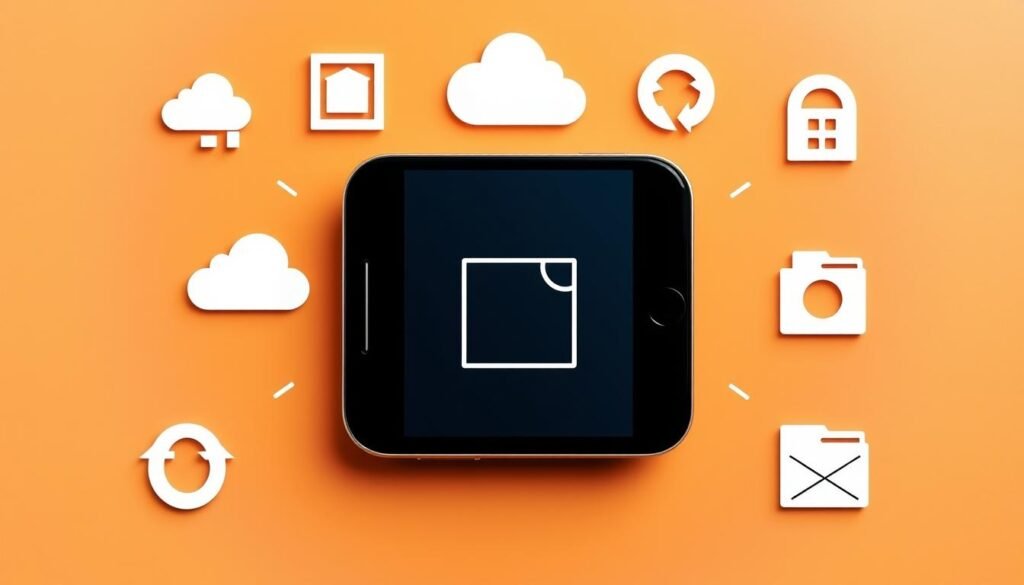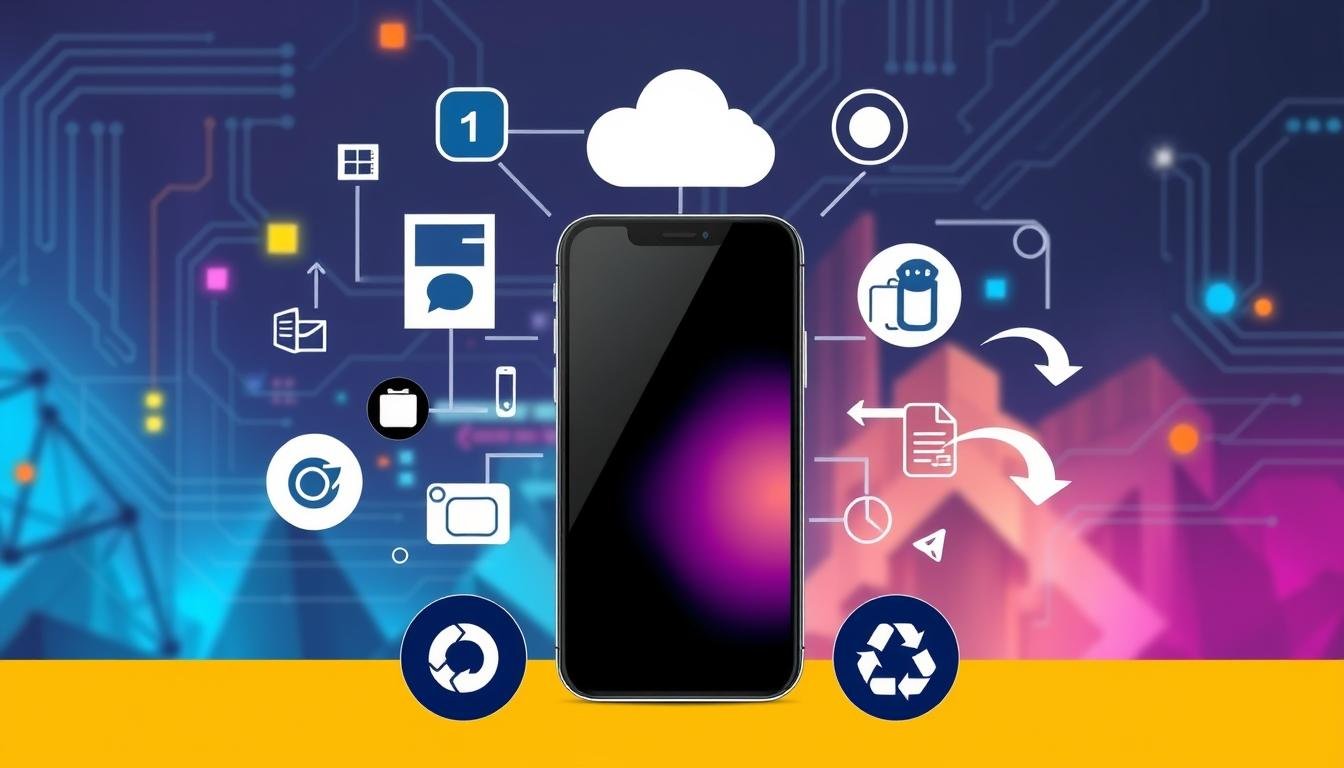Our smartphones have become more than just phones. They are our cameras, libraries, entertainment centers, and offices. Managing their limited storage is a big challenge. It’s not just about avoiding “Storage Full” messages; it’s about keeping our devices running smoothly.
This guide offers tips to help you manage your phone’s storage. You’ll learn how to free up space and organize your files. By understanding how your device uses storage, you can decide what to keep and what to delete.
Key Takeaways
- Learn how to manage and optimize your smartphone’s storage capacity
- Discover strategies for freeing up space by deleting unnecessary files and managing app data
- Explore cloud storage solutions to offload photos, videos, and other media
- Understand how to leverage external storage devices and set optimal storage settings
- Gain insights on advanced storage management features for a clutter-free smartphone
Understanding Your Phone’s Storage Capacity
Learning about your smartphone’s storage starts with knowing its true capacity. Android and iOS devices show detailed storage info in their settings. You’ll see a bar chart that shows how much space you have left and how it’s used.
Identifying How Much Space is Used and Available
Checking your phone’s storage settings will tell you how much space you’ve used and how much is left. This info is key to knowing how much room you have for new stuff. It also helps you see where your storage is being used the most. By knowing used storage vs available storage, you can better use your device’s space.
Categories Consuming Most Space
Looking at what’s using the most space is the next step. The storage breakdown will show you which files, like apps and photos, are taking up the most room. This lets you focus on freeing up space in the most used areas.
Getting to know your phone’s storage breakdown is the first step to better storage use. By knowing how much space you’ve used and what’s using it, you can make smart choices. This helps you get back valuable storage on your phone.
The Role of Apps in Storage Management
Apps are key in managing your phone’s storage. Start by checking your apps regularly. Delete any you don’t need to free up space. It’s also important to manage the storage of apps you keep.
Clearing the app cache and data is crucial. This helps keep your apps running smoothly without taking up too much space.
Regularly Reviewing and Deleting Unused Apps
Our phones get more apps over time, but we don’t always use them. These unused apps take up space. By deleting them, you can save a lot of storage.
This not only saves space but also makes your phone run better.
Clearing Cache and Data of Apps
Even apps we use a lot can use up space. Temporary files and data build up over time. Clearing this data can make a big difference without losing app functionality.
Many phones have tools to help you see how much space apps use. This makes it easier to decide which apps to clean up.
| Statistic | Value |
|---|---|
| Apps, especially games and social media platforms, can consume a significant amount of storage space, beyond just their initial download. | – |
| High-quality photos and videos captured on smartphones can occupy gigabytes of space due to their increased size. | – |
| A significant portion of storage space can be occupied by app cache data from social media platforms. | – |
| Many smartphones provide tools to visualize storage usage, aiding in making informed decisions about app and file management. | – |
By regularly checking and deleting unused apps, and clearing the cache and data of used apps, you can manage your phone’s storage well. These steps are key to keeping your phone running smoothly.

Optimizing Photo and Video Storage
Smartphones are now our main cameras, filling up storage space with photos and videos. High-quality images and clips can quickly use up your phone’s memory. But, you can keep your memories safe without slowing down your phone.
Start by cleaning up your photo and video gallery. Look through your media and delete any bad or unwanted pictures and videos. You can also use cloud storage like Google Photos or iCloud to save space on your phone.
Changing your storage settings can also help. On iOS, choose “High Efficiency” in Camera settings for smaller files. On Android, turn on “Optimize Phone Storage” to save space while keeping full-resolution versions in the cloud.
By following these tips, you can keep your memories safe and your phone running smoothly. Taking care of your storage can greatly improve your phone’s performance.
How to Optimize Your Smartphone’s Storage: Tips for Managing Photos and Videos
Maximizing your smartphone’s storage is key to a smooth device experience. We fill our phones with photos, videos, and apps, leading to a storage battle. But, there are ways to free up space and keep your device running well.
Photos and videos take up a lot of space. Backing up your memories to cloud services like Google Photos or iCloud helps. This way, you can delete local copies and save space. Also, compressing or resizing media files can help without losing quality.
Managing apps is also important. Uninstall apps you don’t use. Many phones can archive unused apps, keeping your data safe. Clearing app caches and data also helps, as these files can grow over time.
| Storage Management Strategies | Estimated Storage Savings |
|---|---|
| Deleting Unused Apps | Approximately 1GB |
| Clearing App Cache and Data | Varies, but can be significant |
| Backing Up and Deleting Local Photos/Videos | Highly dependent on user media consumption |
| Utilizing Cloud Storage Services | Over 60% of users report freeing up local storage |
Cloud storage services can greatly help in managing your phone’s storage. Using platforms like Google Drive, Dropbox, or iCloud lets you store files online. This frees up space on your device while keeping your data accessible.
Effective storage management comes from regular habits and using available tools. By checking your media, apps, and settings often, you can keep your device running smoothly. This ensures you have enough storage for your growing needs.

Managing Photos and Videos Smartly
As a smartphone user, I’ve taken many photos and videos over the years. Managing these memories can be tough, especially when saving space on my phone. Luckily, there are ways to handle my photos and videos well.
Regular Cleanup
One key strategy is to clean up my gallery often. I delete duplicates, blurry photos, and unwanted videos. I also organize my media into folders or albums. This regular cleaning helps free up space on my device.
Utilize Cloud Services
Using cloud storage like Google Photos, iCloud, or Dropbox is also helpful. These services let me back up my media, saving space on my phone. They also offer features like automatic organization and easy sharing, making it easy to manage my collection.
Optimize Storage Settings
Lastly, I adjust my phone’s storage settings to manage better. I change camera settings, enable “optimize storage” features, or back up important media to the cloud. This way, I use my phone’s storage wisely, keeping my memories clear and sharp.

By cleaning up, using cloud storage, and optimizing settings, I manage my phone’s storage well. This ensures my device has enough room for the most important moments.
Deleting Unwanted Screenshots and Downloads
Smartphones are now a big part of our lives. They hold lots of content like photos, videos, and apps. But, all this content can take up a lot of space on our phones. Unwanted screenshots and downloads are a big reason for this.
It’s easy to clear out space by deleting things you don’t need. This includes getting rid of movies, music, or podcasts you don’t watch or listen to anymore. Also, removing unwanted screenshots can really help free up space.
- Identify and delete unwanted screenshots that have accumulated over time.
- Review your device’s downloads folder and remove any files you no longer require.
- Regularly clear the cache and data of apps to free up additional space.
By managing your phone’s storage well, you can make more space available. This means your phone will work better and faster. It’s a small habit that can make a big difference in how you use your phone.
Keeping your phone’s storage in check is all about regular upkeep and smart choices. Spending a few minutes each month to clean out unwanted files can really help. It keeps your phone running smoothly and efficiently.
Leveraging Cloud Storage and External Tools
Managing your smartphone’s storage doesn’t have to be hard. Cloud storage and external tools can help you keep your photos, videos, and files organized. This frees up space on your device.
Services like Google Photos, iCloud, and Dropbox make it easy to back up your phone’s content. They store your photos and videos online. This means you can access them from any device with internet. It also keeps your phone’s storage free and provides a backup in case your phone gets lost or broken.
External storage like SD cards and external hard drives can also help. These devices offer extra space for your files. Just move your photos, videos, and other media to these devices. This way, you’ll have plenty of storage without worrying about running out of space.
| Cloud Storage Platform | Key Features | Pricing |
|---|---|---|
| Google Photos | Unlimited high-quality photo and video backup, intelligent photo organization, easy sharing | Free for basic plan, paid plans start at $1.99/month for 100GB |
| iCloud | Seamless integration with Apple devices, automatic photo and file sync, secure data storage | Free for 5GB, paid plans start at $0.99/month for 50GB |
| Dropbox | User-friendly file management, real-time collaboration, cross-platform accessibility | Free for 2GB, paid plans start at $9.99/month for 2TB |
Using cloud storage and external tools can make managing your phone’s storage easy. It keeps your memories and important files safe while freeing up space. These solutions can improve your phone experience and help you get the most out of your device.
Advanced Storage Management Features
Modern smartphones have cool features to help manage storage. These tools let you control your device’s storage better. This way, you can keep your important stuff and still have room for new things.
Automatic App Archiving
Automatic app archiving is one such feature. It moves unused apps off your device but keeps your data and settings safe. This lets you save space without losing access to your apps.
Manual App Archiving
Some phones also let you archive apps on your own. This means you can pick which apps to remove and still have them later. It’s a smart way to keep your device tidy and efficient.
These smartphone storage management features are really helpful. They help your device run better by freeing up space. With automatic and manual archiving, you can keep your favorite apps and data handy while cleaning up your device.
Customizing Settings for Optimal Storage Use
To get the most out of your smartphone’s storage, you need to customize its settings. Adjusting photo and video compression, automatic app archiving, and cloud storage can help. This way, you keep your digital stuff while keeping your phone tidy.
One great tool is optimizing your phone’s photo and video settings. Many phones let you compress files without losing quality. This saves space and keeps your memories safe.
Automatic app archiving is another useful setting. It moves unused apps to the cloud or external storage. This keeps your phone organized and saves space for your favorite apps.
Using cloud storage services like Google Drive, Dropbox, or iCloud can also help. They let you store photos, videos, and more in the cloud. This frees up space on your phone and makes your content accessible everywhere.
“By taking the time to customize your smartphone’s storage settings, you can transform your device into a well-organized, storage-optimized powerhouse.”
Exploring and customizing your phone’s settings is key to its full potential. So, start experimenting and find the best ways to manage your phone’s storage for your needs.
Delete or Move Files
Deleting downloaded files and moving them to a computer can free up space on your smartphone. It’s smart to regularly check and remove movies, music, and other files you don’t need anymore. This can help you get back a lot of space.
Delete Downloaded Files
Downloaded files can fill up your smartphone’s storage fast. Spend some time going through your downloads folder. Delete any files you don’t need anymore. This simple step can quickly increase your available storage.
Copy Files to a Computer
If you have files, photos, or videos on your phone, think about moving them to a computer or external drive. This clears space on your phone and gives you a backup in case something goes wrong. Just plug your phone into a computer with a USB cable and move your files where you want.
By getting rid of files you don’t need and moving important ones to a computer, you can free up smartphone storage. This keeps your device running smoothly.
“Regularly decluttering your smartphone’s storage can make a significant difference in its performance and available space.”
Managing your smartphone’s storage is a continuous task. Stay on top of it. Make it a routine to check and remove files you don’t need. This way, your device will always have enough space to work well.
Conclusion
This guide has given you many ways to make your smartphone’s storage better. It focuses on managing your photos and videos. Knowing how your device stores data and the role of apps helps you keep your phone organized.
Using the tips from this article, you can clear space and keep your phone tidy. You can use cloud services like Google Photos and iCloud. You also know how to use app archiving and storage settings.
Managing your photos and videos well keeps your phone running smoothly. Regularly deleting files and using storage features helps a lot. With these tips, you can handle smartphone storage easily and enjoy a clean phone.






